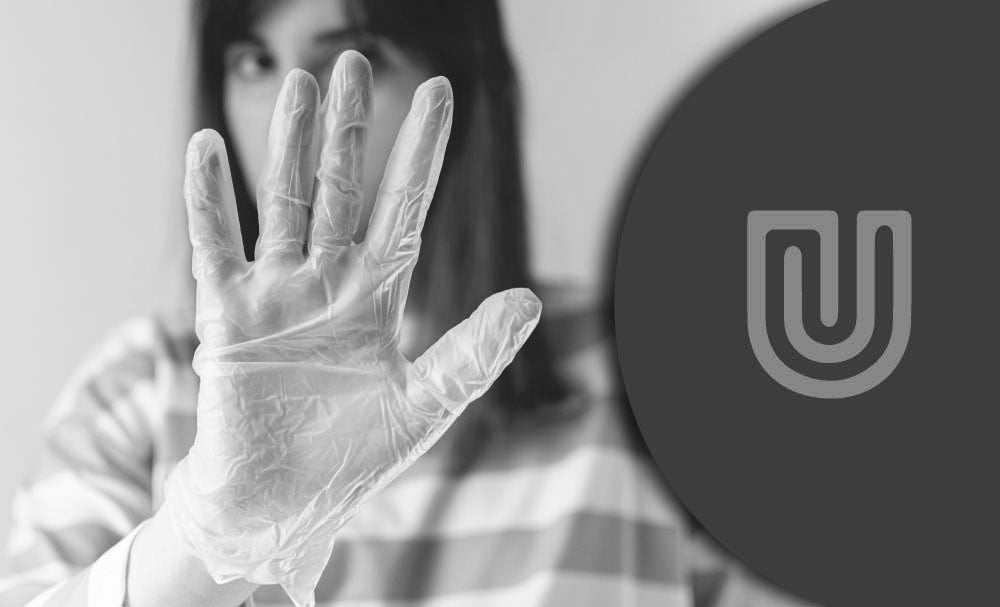Our vinyl gloves are an incredibly popular part of our range here at Unigloves. For over three decades, we’ve been manufacturing the highest quality vinyl gloves for our huge variety of customers.
Despite the rising popularity of nitrile gloves, and the traditional preference for latex gloves in many industries, vinyl gloves have continued to be an integral part of our range due to the number of benefits they offer over other glove solutions.
If you’ve ever wondered what these benefits are, or ‘How are vinyl gloves made?’, this article will help to demystify the vinyl glove and help you choose the most appropriate vinyl glove for your application, every time.
How are vinyl gloves made?
Vinyl gloves are a completely synthetic glove (and hence, free from latex), and are made from the polymer material called polyvinyl chloride, or PVC. The material created through this process is hard and rigid, and so, in order to manufacture PVC into a more flexible material suitable for disposable safety gloves, a plasticiser is added after polymerisation.

Here at Unigloves, we go further than many manufacturers in our production of vinyl gloves, to help ensure that not only are they flexible, but that they are also comfortable to wear, durable, and help to protect wearers’ hands against a range of hazards. Our unique manufacturing processes, and the fact that we use only high-quality materials in the production of our gloves, are what makes us one of Europe’s leading safety glove manufacturers.
Why choose vinyl gloves?
As well as being one of the most affordable disposable safety glove options on the market, vinyl gloves offer a range of other important benefits over alternatives such as latex and nitrile gloves. Due to their relatively low cost, you’ll find vinyl gloves are popular not only in workplaces, but in-home and domestic applications all over the world.
As we’ve mentioned above, vinyl gloves are a completely synthetic disposable safety glove, and as such, are free from latex. This means they’re safe for use by those with latex allergies. In fact, the Health and Safety Executive of the United Kingdom recommends avoiding the use of latex gloves where at all possible, to protect the safety of workers and the general public. For this reason, vinyl gloves are becoming more popular in medical and healthcare applications.
Another benefit of vinyl gloves for those that suffer from sensitivities (such as Type I and Type IV sensitivity), is that they are also free from chemical accelerators. These types of accelerators are generally used in the production of nitrile gloves, which makes these types of gloves unsuitable for some hands. Therefore, vinyl gloves, being free from both latex and chemical accelerators, are a fantastic choice for those with sensitive hands, dermatitis, or latex allergies.

As vinyl gloves tend to be less robust than some other glove varieties, as well as being relatively cheap, they are often seen as a ‘budget’ alternative. However, vinyl gloves are not only a cost-effective but incredibly versatile solution for a wide variety of applications.
Their inherent protective properties help to safeguard hands against a range of low-level hazards. These include, but are not limited to, protecting hands and wrists from bodily fluids, biohazards such as blood- and urine-borne pathogens, detergents and cleaning chemicals, paints, dyes and more.
Vinyl gloves from Unigloves are also available in medical grade varieties (medical gloves), and are food safe, which makes them suitable for a range of applications from medical examinations, and ensuring infection control, to processing and handling food. These properties make vinyl gloves a preferred choice in many industries, such as:
- Food preparation and handling,
- Care home work,
- Cleaning and janitorial roles,
- Painting and printing work,
- Healthcare and hospital fields,
- Hairdressing and more.
We hope this article has helped to answer the question, ‘How are vinyl gloves made’ and shed some light on the many benefits of these cost-effective and versatile safety gloves. For more information about our vinyl gloves range, please take a look at our product guide, or get in touch with our team today.


